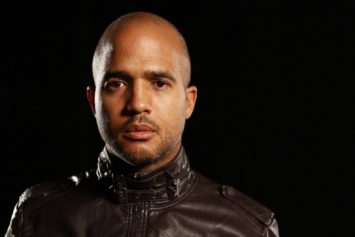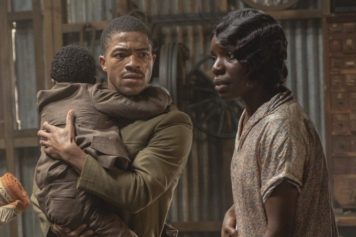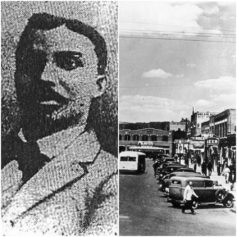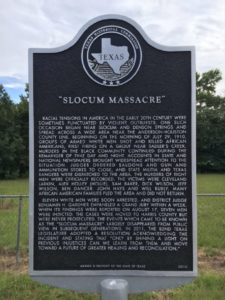
Slocum Massacre historical marker (Photo: Constance Hollie-Jawaid)
July 29 marks the anniversary of the Slocum Massacre, where in the East Texas town of Slocum, Black people were gunned down and slaughtered by a white mob of hundreds.
It started in the summer of 1910, when three Black teens crossed paths with a group of armed white men on a dirt road. The mob began firing on the young Black men, whether in retaliation for a scuffle between a white man and a Black man, or over rumors over Black retaliation for a lynching. And this is how it began. But this is not how it shall end.
The sheriff at the time, Anderson County Sheriff William Black told The New York Times that 200 or 300 people were killed. “They hunted the Negroes down like sheep,” he said. Many of those bodies have not been recovered to this day. On August 13, 1910, a group of ministers from Washington, D.C., wrote a letter to President Taft asking for action. “We have come together to make a sane protest to the reason and enlightened conscience of the great American people. We deplore the fact that a meeting such as this should be necessary. An impartial enforcement of law and unprejudiced treatment of citizens, regardless of ancestry, would leave little excuse for a meeting like this,” the letter said, according to the Zinn Education Project. “Unless something is done to make human life more valuable and law more universally respected, we feel that our beloved country is doomed to destruction at no distant date.”
One of the descendants of the massacre victims, Constance Hollie-Jawaid–whose great-grandfather, Alex Holley, perished at Slocum–has not given up the quest to find the bodies of these ancestors, and to remember their names and honor their memory.
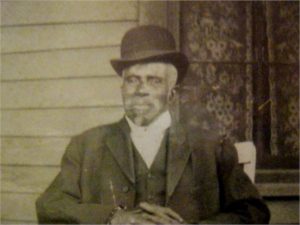
Jack Holley, survivor of Slocum Massacre
“Years ago, my family–my father, my uncle– they tried to get the word out about what happened to our family and other families to get justice and get the process started, and the state flat out denied it even happened,” Hollie-Jawaid told Atlanta Black Star. “After my father and uncle passed, I carried the baton, because I passionately believe, you know, like the griot if we don’t tell the story of our history, they won’t know the greatness of our people. And if we don’t demand that the wrongs of the past are made right, our struggle will be in vain.”
According to Hollie-Jawaid, if Black lives of the past are not valued and respected, Black lives today will not be valued or respected. There has been a concerted effort in Texas to erase the past, she contends. “I believe there was a dedicated campaign to hide the truth, because they know how valuable the truth would be to present and future generations,” she said. “They lied about Slocum because they know that telling the truth is the first step of dismantling those systems of oppression that eat the core of people’s existence. We must tear those down,” she added. “And those who benefit from the oppression will no longer have dividends to collect.”
While the state of Texas recorded 8 deaths, the sheriff said there were hundreds. What happened to these ancestors was a crime, Hollie-Jawad said, and the fact that there are hundreds of unrecovered bodies is itself an atrocity and a crime. These Black folks in the ground need their burial rites, as is the case with Native Americans and other cultures. Even today, the state of Texas will not assist in the efforts to reclaim the dead.
Hollie-Jawad shared an encounter with a white man who owns the site of the Silver Creek School where hundreds of the bodies were reportedly covered up, with the help of school children who were directed to pound on the ground. She sought access to the property, with the help of ground-penetrating radar from a local university. The landowner called her back and denied Hollie-Jawad access to the land to locate the mass grave. “You didn’t tell me you’re Black, you didn’t fully disclose,” the man said, in her own words. “So people are the foundation of the racist climate in East Texas,” she laments. “I want my ancestors to be buried, respected and honored. And for them to be packed in mass graves like dogs is disrespectful to them, and disrespectful to us.”
In January 2016, after more than two decades of applications, letters and records requests, an historical marker was unveiled to remember the Slocum Massacre. When speaking to Atlanta Black Star, Hollie-Jawaid was on her way from her home in Dallas to Slocum in order to erect placards with the names of the dead, and pour libations. “The Afrocentric culture is about respecting and paying homage in order to garner strength, to let them know that what they did was not in vain. For those who are still buried, I will make sure to do what I can so we remember their names,” she said.
Like the current Black movement to remember the Black people taken from us by police violence and gun violence, saying the names of the dead is significant. When she returned to Cameroon to visit her ancestral homeland, Hollie-Jawad learned this. “They told me the importance of speaking the names of those who were lost in the struggle to free our people, speaking the names of those who were taken in the Transatlantic slave trade. When you say their names, you honor and respect them, and garner the strength they had to endure those atrocities,” she said. “Like Sandra Bland, saying the names humanizes us. I want people to know that whether it is Tulsa (Greenwood) or Slocum, remember the names. The names keep it intimate. This is personal.”
It is important that Black people know our history and tell our history, Hollie-Jawaid insists, as she fights to reclaim the past and allow it to live on for future generations. “We cannot leave our past to let others tell it, because it won’t be told in a way that does us honor. Know your history and tell your history and always remember, we must never forget.”
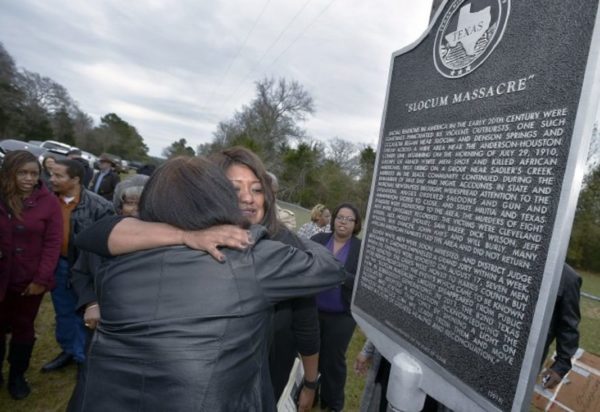
Constance Hollie-Jawaid is hugged by a fellow descendent of Jack Holley following the unveiling Saturday, Jan 16, 2016, of a Texas State Historic Marker memorializing the July 29, 1910, Slocum Massacre near the unincorporated town of Slocum, Texas. Ms. Hollie-Jawaid is the great, great-granddaughter of Jack Holley, one of the survivors of the massacre of black residents by their white neighbors, who worked more than two decades to get the marker set in place. (ANDREW D. BROSIG/TYLER MORNING TELEGRAPH VIA AP)
